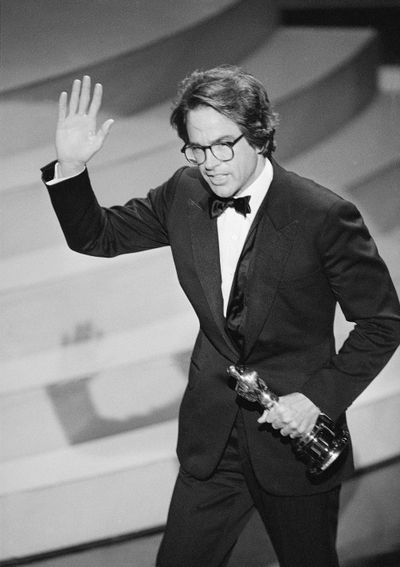Heaven Can Wait: Back in L.A., Rams go for a Hollywood sequel

ATLANTA – Before there was Jared Goff, there was Warren Beatty.
Years before Goff or any of today’s Los Angeles Rams were born, Beatty had been carried off on his teammates’ shoulders to celebrate a Rams title that only Hollywood could dream up.
He played quarterback Joe Pendleton in the 1978 Academy Award nominated movie “Heaven Can Wait.” At the end, he leads L.A. to an otherworldly Super Bowl victory over the Pittsburgh Steelers.
It all happened during a time when the real-life Rams, with Joe Namath, Rosey Grier and the rest of the Fearsome Foursome, embodied everything about Hollywood cool, even if the notion of them winning the Super Bowl felt like something that could only happen in the movies.
It was a time when the Steelers were winning all the Super Bowls and the Dallas Cowboys were becoming America’s Team.
But, Beatty told the Associated Press, “there was no reason not to make the movie about the Rams.”
“They were fun. It was fun,” Beatty said. “The only word I can come up with is, ‘fun.’ ”
Funny, too.
In “Heaven Can Wait,” Beatty’s character, Pendleton, is snatched away to heaven before his time by an overzealous escort (Buck Henry). After realizing the mistake, the escort and his boss, Mr. Jordan (James Mason), try to place the quarterback back into his original body, only to discover he has been cremated. The search for a substitute body ensues, and the result is a touching love story (with Julie Christie) punctuated by a steady stream of laughs, most courtesy of Pendleton’s hysterical, cheating wife (Dyan Cannon) and her bumbling, ridiculous lover (Charles Grodin).
In the ’70s, there was no bigger star in Hollywood than Beatty, who had burst onto the scene in “Splendor in the Grass” in the `60s, produced and starred in “Bonnie and Clyde” and “Shampoo,” and seen his films nominated for more than a dozen Academy Awards.
Given his star power, Beatty had no trouble landing dozens of NFL players to play extras in the football scenes. In one, Fearsome Foursome member Deacon Jones repeatedly tees off on Pendleton, who stands underneath a center unwilling to deliver him the ball.
Beatty said he didn’t use a stand-in for that one. And though he had one on call for the scene at the end when he leads the Rams to their Super Bowl victory, he didn’t use him there, either.
That scene was shot during halftime of an actual Rams preseason game at the L.A. Coliseum. They had limited time to run 14 plays.
“I told him, ‘I’m going to run one play, maybe it’ll be good, but be ready to come in,’ ” Beatty said. “I completed the pass and thought, ‘Gee, it worked.’ Got some adrenaline out of that. I told him, “I’ll do the second play, then be ready.’ That worked, too. Then the third play worked. I ended up doing all 14 plays. And I got to do what I’d always wanted to do in junior high, which was to be the quarterback instead of the center.”
A recently retired Rams running back, Les Josephson, served as an extra, and as technical adviser for the football scenes. He said the plays Beatty ran during the Super Bowl scene came straight from the Rams playbook.
“He could throw the ball pretty well,” Josephson said. “He was a pretty good athlete growing up.”
But Beatty said he turned down a few scholarship offers, and gave up playing center (and linebacker) for acting.
“I went to New York and started getting serious about what you’d say was the stuff taught by Head Coach Stanislavsky,” he said. (Konstantin Stanislavsky is the forefather of method acting.)
Beatty also directed and produced the movie, which won two Oscars and got nominated for seven others, including picture, actor and supporting actor and actress.
Had he been more persuasive with his good buddy, Muhammad Ali, this remake of the 1941 classic “Here Comes Mr. Jordan,” would’ve been about boxing, same as the original.
“I wanted to do a movie with Ali, and we went back and forth, we had a lot of fun talking about it,” Beatty said. “But I finally realized he wasn’t about to put boxing aside to do a movie, and I said, `Ali, if you don’t do it, I’m going to change it to a football player and do it myself.“’
(Quick side story: Beatty said Ali liked to throw down the gauntlet at the actor: Let’s go out to lunch, he challenged Beatty, and see who more people recognize.)
Sticking with a football theme turned out to be a good choice.
And the movie wound up being prescient in more ways than one.
About a year after it came out, the Rams, behind a backup quarterback, Vince Ferragamo, made a magical run that ended in the franchise’s first Super Bowl – against the Steelers, no less, just like in the movie. Only L.A. lost that one, 31-19.
Fifteen years later, the Rams moved to St. Louis and lost their L.A. connection for two decades.
But now they’re back, Beatty’s a fan – and there’s a delicious irony developing.
At the end of “Heaven Can Wait,” the Rams are in the Super Bowl and their quarterback is knocked senseless by a vicious hit.
Pendleton, in need of another, more-permanent body to inhabit, takes over and, a few minutes later, scoops up a fumble and runs it in for the winning touchdown.
In the movie, the quarterback wears No. 16 on that classic, blue-and-yellow Rams home jersey. And Joe Pendleton becomes Tom Jarrett.
In real life, a guy named Jared – Jared Goff – will wear the blue-and-yellow No. 16 for the Rams on Sunday.
Will L.A. win again? Now, there’s a sequel Hollywood would love.